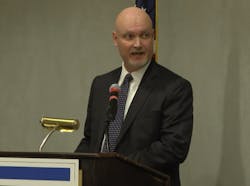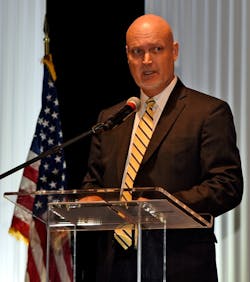LITTLE ROCK. Keeping up with the changes in commercial vehicle regulations and technologies isn’t just a challenge for fleets; figuring out how to “adopt and interact” is critical for the roadside enforcement community as well, says Collin Mooney, executive director of the Commercial Vehicle Safety Alliance (CVSA).
Mooney sat down with American Trucker for a Q&A session at the conclusion of the association’s annual gathering of safety officials and industry representatives last week.
What stands out from this year’s conference?
The new Enforcement and Industry Modernization committee got a lot of attention. It addresses advancements in technology such as electronic credentialing, and there was a lot of discussion of infrared brake screening and electronic inspections. We’re in a transition phase with the motor carrier industry in adopting several technologies—so how does this change our program?
There’s truck platooning issues, and how will we in enforcement break platoons, how will we interact with the convoy? There’s V2V (vehicle-to-vehicle communication), and how is that going to work with our inspection programs? Autonomous technology is already here, and manufacturers are doing testing and looking for exemptions: How does a driver track hours of service while driving an autonomous vehicle in test phase? There was a little of discussion as to whether it should be documented as on duty, not driving—but we’re not there yet.
The session devoted to the coming electronic logging device mandate generated a lot of attention as well. Fleets are certainly developing strategies for operating after the Dec. 18, 2017 implementation date, and there’s already been talk here about exemptions for carriers who find their vendor might have erred in the self-certification process. What will the ELD transition mean for roadside inspectors?
On the whole ELD implementation plan, the number of questions and the anxiety level in the industry are only going to increase. And talking about exemptions for ELD vendors is premature. [That FMCSA is not ready with] Web Services and eRods is an issue. Even though we’ve been working with all of our vendors, and even though they have robust systems, until they demonstrate to us an effective data transfer from the driver to roadside, we don’t know what sort of challenges we’re going to encounter.
We’ve a crew here videotaping vendor presentations for training purposes, but the one piece missing is the data transfer and how that is effectively going to work. We know it’s coming, we just don’t know when and how much time we’re going to be given to test and train roadside enforcement. If we don’t have anything by our workshop in April, then we’ll start getting a little more aggressive [with FMCSA]. That’s not just for the enforcement community, that’s for everybody. That’s how motor carriers and enforcement coexist. We want to make sure the transition to ELDs is a seamless as possible.
Fleets are concerned that, under the Compliance, Safety, Accountability (CSA) program, their safety records are more about where they operate than how safe they truly are. What is CVSA doing to ensure enforcement uniformity from state to state?
Enforcement priorities are a state matter. CSA is FMCSA’s program. What we don’t want is to have CSA change the core roadside inspection program that we’ve had in place for 30-plus years. What we’re trying to do is improve our data collection processes that work well with the CSA program, so that we’re documenting and recording violations uniformly in all jurisdictions. The more we can do to assist the inspector ultimately helps the motor carrier.
FMCSA always preaches uniformity. The data collection software that we use primarily is FMCSA software. So until FMCSA works with us to update that data collection software, we’re going to have challenges. This is important: Data drives all of their safety programs—every single one of them. The better data you have, the better safety programs you can have. It’s that simple.
Carriers and drivers can petition FMCSA for exemptions from certain regulations if they can show non-compliance doesn’t impact safety, but CVSA contends exemptions are difficult to manage at the roadside. Is there a middle ground?
We are not in favor of exemptions. They are problematic in the motor carrier enforcement community, and we feel that they create an un-level playing field for the industry. Because of the number of exemptions—whether it’s industry segments or individuals—we may make mistakes at roadside, which isn’t right because we want to comply. We do have an exemptions tracker on our CVSA member portal where we’ve created a catalog for segments and motor carriers, but we don’t track exemptions to the individual level.
Since this is a political year, what impact does the election cycle have on the enforcement community?
For the most part, transportation safety seems to be bipartisan. There’s a role that needs to be played whether you’re a Republican or Democrat. Obviously, rulemakings and regulatory efforts tend to slow down during an election year, but it doesn’t impact us dramatically. I’ve been here through [FMCSA Administrators] Annette [Sandberg], John [Hill], Anne [Ferro], and Scott [Darling]. We’ve been fortunate in that Annette and John ran state enforcement programs, and were actively involved with CVSA. Anne came from state government as well, and was very well respected within the motor carrier community, and the transition was very easy. Scott was chief counsel inside FMCSA, so we’ve gotten to know him quite well already and it’s been another seamless transition.
We’ve been very fortunate that there hasn’t been a complete elimination of the guard and whole new regime put in place. Stability has been very, very helpful. FMCSA is only 16 years old now, going on 17, so it’s still in the adolescent years. But the whole agency is starting to figure out their role—what works well, what doesn’t work well. With every year that passes, things are getting better. It’s a partnership. Obviously, when the administrator’s here [at the CVSA conference] for a week, interacting with all of his stakeholders—enforcement, trade associations, trucking companies—it bodes well.
About the Author
Kevin Jones
Editor
Kevin has served as editor-in-chief of Trailer/Body Builders magazine since 2017—just the third editor in the magazine’s 60 years. He is also editorial director for Endeavor Business Media’s Commercial Vehicle group, which includes FleetOwner, Bulk Transporter, Refrigerated Transporter, American Trucker, and Fleet Maintenance magazines and websites.
Working from Beaufort, S.C., Kevin has covered trucking and manufacturing for nearly 20 years. His writing and commentary about the trucking industry and, previously, business and government, has been recognized with numerous state, regional, and national journalism awards.


